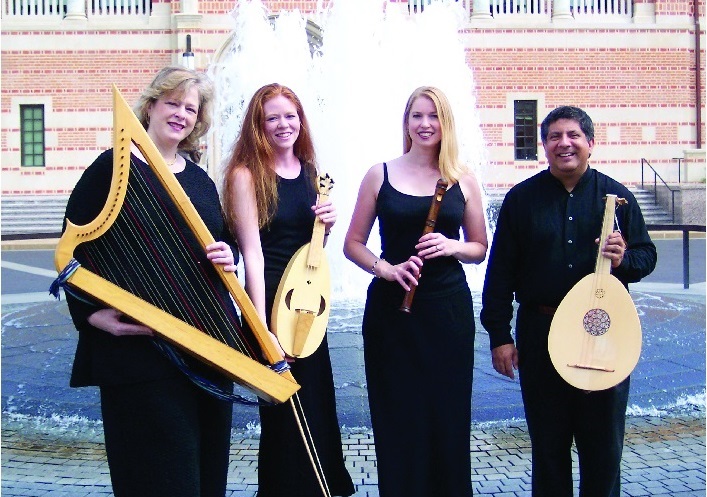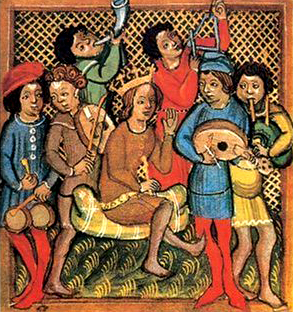Lute, Bagpipes, Recorders, Drums
Istanpitta plays medieval music of exiled Spanish Jews, with Klezmer and Arabic flavors.
Early Music Now welcomes the medieval ensemble Istanpitta for a program “Exiled: Music of the Sephardic Jews & the Middle East” this Saturday evening at St. Paul’s Episcopal Church. The Istanpitta Ensemble includes Al Cofrin, medieval lute, bagpipes, vielle; Camila Parias, vocals, percussion; Niccolo Seligmann, vielle; Rosalind Buda, recorders, bagpipes, percussion; and Kylie Hilali, qanoon, percussion.
This concert takes a musical journey exploring the exile of the Jewish people from Spain, and their travels to the Middle East. The program highlights the fusion of Western and Eastern influence in Spain with songs, instrumental works and stories. The program imagines a farewell party. Musicians who have worked together in the courts of Spain in the early 14th century reminisce about old times. They share a love for variety in music. Some have traveled to Italy and beyond. Some play for festivals, weddings and other occasions as well as serving the court.
From the 8th century largely under Muslim rule, Moorish and Jewish communities in the Spanish peninsula thrived side by side. A creative culture created poetry, music, philosophy and architecture, borrowing from each tradition. Christian kings began to challenge the caliphate. The reign of Christian king Alfonso X from 1221 to 1284 represents a high point – Jews, Muslims, and Christians had prominent roles in his court. Alfonso X commissioned the Cantigas de Santa Maria, celebrated in an Early Music Now concert by the Newberry Consort in 2015.
During the Medieval period, areas ruled by Muslim caliphates were in a state of war with the Catholic kingdoms. Christian kingdoms became increasingly intolerant. In 1492, the Catholic Monarchs of Spain (Isabella I of Castile and Ferdinand II of Aragon), who ruled what is most of contemporary Spain, decreed that Muslim and Jewish residents must either convert to Christianity, leave the country or be executed. A majority of the Jewish population is believed to have converted to Christianity. (Or at least created the appearance that they had converted.) But many Sephardi Jews left Spain; moving around the Mediterranean from North Africa to the Ottoman Empire, Portugal and Italy. Blended traditions were further transformed over the next centuries as Sephardi Jews assimilated more of Arabic music traditions and in turn influenced the communities within which they settled.
The celebration recreated Saturday evening springs from the imagination of Al Cofrin, Artistic Director of Istanpitta. Documentation from this time is severely limited. The simple music notation that exists does not indicate time signatures, length of notes or beat. Melodic lines are often less important than rhythms. Poetic lyrics are fit with melody lines that could have come from earlier sources. But musicians took their cues from meager instructions and knew intuitively how to improvise – as with contemporary jazz. That adds energy and interest for audience and performer alike.
No instruments survive. Period instruments are all recreations inspired by paintings. Contemporary makers faithfully reproduce the exterior of the instruments, but may use contemporary internal strategies to create a larger sound that can be appreciated by today’s larger concert audience.
The concert ends with a Jewish prayer and a blended Christian Chant and Moorish Dance as the musicians prepare to leave.
The energy of the music and the relaxed atmosphere of an imagined, open-ended celebration offers a pleasant evening and a time travel to another era.
Istanpitta will perform at 5:00 p.m. on November 17 at St. Paul’s Episcopal Church in downtown Milwaukee. (914 E. Knapp St.) There will be a pre-concert lecture at 4:00 p.m. in the Great Hall. The program begins at 5:00 p.m. Parking is available on the street. This venue is also near the #30, #14, and Gold Bus lines. Tickets ($29, $46 adult – $15, $10 students) may be purchased online, through Friday afternoon at 414-225-3113 or at the door.
The full program listing may be found online. Preview tracks from Istanpitta’s Exiled CD at YouTube.
The ensemble is performing two school outreach concerts (including the Milwaukee Jewish Day School) and a senior residence. This is part of Early Music Now’s commitment to offering free educational concerts in the metro Milwaukee area.
Early Music Now returns in December a concert by the vocal ensemble, Pomerium. Their program, “Creator of the Stars: Christmas Music From the Old World,” will be performed December 8 at 5:00 p..m. and December 9 at 3:00 p.m. at St Joseph Chapel (1501 S Layton Blvd.) This concert presents a selection of Gregorian chant and monophonic devotional songs for the Christmas season alongside polyphonic works by Renaissance masters William Byrd, Josquin des Prez, and Giovanni Palestrina.
Preview
-
A Sacred Choir, 70 Voices Strong
 Dec 14th, 2025 by Martha Brown
Dec 14th, 2025 by Martha Brown
-
Prometheus Trio Goes Bohemian
 Dec 3rd, 2025 by Martha Brown
Dec 3rd, 2025 by Martha Brown
-
Present Music Offers New Choral Works
 Nov 20th, 2025 by Michael Barndt
Nov 20th, 2025 by Michael Barndt





















